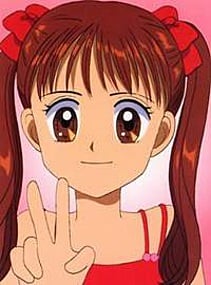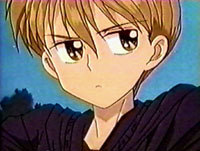Review
by Alexander HarrisKodomo No Omocha
| Synopsis: |  |
||
Miho Obana's "Kodomo No Omocha" (translated: "Child's Toy") follows, as it's central star, Sana Kurata--a cute, redheaded 11-year-old TV and film star, who has an uncontrollably hyper and active personality. Seriously. This girl is LITERALLY bouncing and smiling and singing all over the place. She's the star of the live-action after school show "Child's Toy," one of the most popular shows in Japan--though we actually spend very little time concerned with her affairs on the show. The main focus of the series puts the spotlight on Sana's life, the people and friends and enemies in her life, and her reactions and developments as a child, and as a human being. At the beginning of "Child's Toy," she is pitted against fellow classmate Akito Hayama. Hayama is a very calm, passive individual. Very little bothers him (on the surface, anyway) and he is almost always in control of himself. The conflict between him and Sana not only stems from the dichotomy of personalities (very calm V.S. very emotional), but also because of the situation that occurs in their class. Hayama, through the execution of certain covert activities, has found the weak spot of their spineless teacher; and because Hayama could easily get her fired from her job, the teacher allows Akito and his followers of mindless male classmates to wreak havoc upon the class. Sana does not like this. Needless to say, she (very vocally) stands up against Hayama. And all hell breaks loose. |
|||
| Review: | |||
As time passes, we dive into the characters minds and home lives. Roles change. Relationships develop and deteriorate. More opposition occurs as new characters are introduced. And through it all, "Child's Toy" manages to keep a light-hearted, humorous view of itself and reality in general. Most of the time. And although the show will sometimes shift focus slightly to put another character into the spotlight, the main attention is always aimed at the dichotomous pair of Sana Kurata and Akito Hayama. "Child's Toy" is a truly rare, fascinating mix between comedy and drama; and although comedy is the more predominant trait, it doesn't drown out the drama characteristic either. There are several crucial serious, dramatic moments that are handled quite brilliantly in the show. And as the plot goes on, and as the antics and the angst continue, we become more and more attached to the characters, and one begins to notice that some of the things they do might seem like they're done for a laugh, but if you probe deeper, you'll find that certain actions of a given character are actually windows that give a view of the emotions of that character. Example: Sana likes to sing. She does so in almost every episode. It can be a bit annoying at first, but one gets used to it. She often sings her emotions instead of saying them (especially when they're "negative" emotions like sadness, etc.); and despite the fact that sometimes the song may be upbeat, the words tell you that she's feeling otherwise, even if it doesn't show on her face. This maybe because she never truly learned how to express emotions properly, and this is the only way she knows how to deal with "bad" feelings. Or it may be because actually coming out and saying "I feel depressed" would destroy her mammoth self-image of being a happy, likable 11-year-old. Or it may be because she doesn't want to bring other people down with her own problems. On the other hand, it may be all three. "Child's Toy" is drawn in typical Shoujo fashion; not as cute and "fluffy" (for lack of a better word) as "Card Captor Sakura," but with very wide eyes and skinny, cute characters nonetheless. But in this case, the quality of the animation really takes second place to the story. One would probably not watch "Child's Toy" to look at the "pretty pictures". On the surface, "Child's Toy" is very simple, funny, and sweet, with a good bit of drama thrown in. And to some people, that may be all there is to the show. However, if you look deeper, there's much more to be seen, and a lot more to be discovered. Unfortunately, Child's Toy HAS NOT officially been licensed in America. I suppose the fact that it has 102 episodes doesn't help much, since a lot of companies don't want to make that kind of long-term commitment. In addition, the overall bizarreness of the show is probably another big hindrance, too. Currently, the only way to get a translated version are fansubs, which are readily available online.  |
|
The views and opinions expressed in this article are solely those of the author(s) and do not necessarily represent the views of Anime News Network, its employees, owners, or sponsors.
|
| Grade: | |||
| Production Info: | ||
|
Full encyclopedia details about |
||